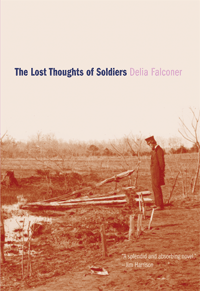The Lost Thoughts of Soldiers

Ten years ago my husband and I vacationed out West, driving aimlessly from landmark to landmark, looping from Mt. Rushmore to Devil’s tower to Yellowstone to Deadwood to the Badlands, not following any particular timetable other than a tentative reservation made at The Irma Hotel.
One cloudy afternoon, we swung upwards into Montana to visit the site of America’s worst military disaster, the battle of the Little Bighorn. In 1875, Sioux and Cheyenne Indians, outraged over the continued intrusion of white people into their sacred lands, banded together with Sitting Bull to fight against the settlers. During the summer of 1876, the 7th Cavalry, led by Lt. Col George Custer, split into three parts to attack and defeat the Sioux. However, the Army seriously underestimated both the difficulty of the terrain and the number of enemy combatants, and they were quickly overpowered and surrounded. Prior to the slaughter of the settlers by the Sioux, Custer sent Captain Frederick Benteen to block the upper valley, while Major Marcus Reno was to pursue the Indians across the river and charge the village, while Custer lead a division to continue marching forward.
With the advantage of their numbers and familiarity with the terrain, the Indians drove Reno’s squadron out of the village before turning their attention to slaughtering Custer’s division. Totally surrounded by the Oglala Sioux under the command of Crazy Horse, Custer ordered his men to shoot their own horses and use them as barricades. By the end of the hour, the entire Seventh cavalry was slaughtered, except for Benteen’s group, and a few remaining members of Reno’s. When it was over, the Indians walked among the hundreds of dead, mutilated and scalping them before leaving to prepare for the next battle in the war to save their culture and their land. It must have been so quiet the morning after. The land no longer tells the story, and only a few white markers, popping up like new teeth in a baby’s jaw; ragged, stubby, and white in the landscape, give any indication that there was ever any human joy or suffering in the rolling green grass underneath the endless Montana blue.
It must have been so quiet the morning after. The land no longer tells the story, and only a few white markers, popping up like new teeth in a baby’s jaw; ragged, stubby, and white in the landscape, give any indication that there was ever any human joy or suffering in the rolling green grass underneath the endless Montana blue.
It's up to the poets, artists, and historians - those who love the intangible - to help the rest of us see what time has made invisible. They show us the bloodstains beneath the grassy fields that gave bloom to a generation of hardy prairie flowers, reminding us that life and death lie in intertwining layers. Delia Falconer’s The Lost Thoughts of Soldiers an incredibly poetic novella ten years in the making, layers little lives, little deaths in the life of Captain Frederick Benteen, the commanding officer who survives, who must live and die in the glorified legend of the vain, arrogant Custer.
Benteen, who went home to Georgia to live a quiet life with his wife, Catherine “Frabbie” Benteen, struggles with the depression of living for twenty-three years after the battle of the Little Bighorn, and quietly succumbing to the belief the public held that his duty was to die with Custer. He receives letters daily from eager young historians wanting the truth behind the bloody battle, and ignores them all until one catches his eye from a young Chicago man who “wants to set the record straight.” Over the course of a morning, Benteen reminisces over the journey to Little Bighorn. He decides that he will enlist the young man’s help to “write the lost thoughts of soldiers…not the grand story, he has never known his life that way, but the seams and spaces in between. This is history too…the weight of gathered thoughts, the cumulus of idle moments.”
In these idle moments before their last battle, Falconer crafts exquisite character sketches of the men in Benteen’s troop, each sketch a poem, each sentence carefully crafted to whittle every soldier down to sparse, lean imagery. Within the structure of the delicate prose, Falconer fleshes out the stories of boyish young men, filled with crude humor and dreams. The minimalist style is similar to Cormac McCarthy in its delivery, but with more emphasis on poetic style and less emphasis on plot.
The Lost Thoughts of Soldiers is a highly enjoyable novella, as long as the reader doesn’t find a plot particularly necessary. If you’re in it for the beautiful writing alone, you won’t be disappointed.
______________________
The Lost Thoughts of Soldiers
by Delia Falconer
2006 by Soft Skull Press
Hardcover, 146 pp
ISBN: 1-933368-17-9
Sunday, July 30, 2006
<< Home
